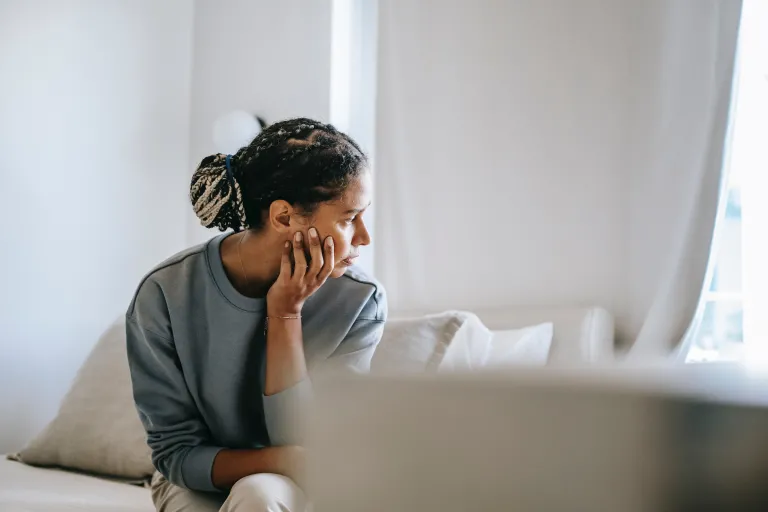
Exploring the stigma of loneliness, Rosel Jackson Stern and Ammanda Major discuss the difference between being alone and feeling lonely. They encourage acceptance of loneliness, offering self-care as a solution, rather than seeking quick fixes.
I recently moved to a new city and struggled to make lasting connections. The weekend would roll around and I had nothing on the books, despite wanting to make the most of this new and exciting time. Naturally, I messaged everyone I could to go out or do a fun activity. It was mainly to no avail however and I had to just sit in the loneliness, commit to doing something on my own and accept that this is how it is for the time being. My loneliness became an unwanted visitor camped out in the corner of my vision. Even if I lost sight of them for a moment during a hangout with friends or a good first date, they would be there.
The Office for National Statistics (ONS) has published data that suggests that loneliness is on the rise in the UK. The NHS lists a symptom of loneliness as a reluctance to attend social events. It seems particularly cruel to deprive ourselves of moments of connection when we most need it. If you Google how to tackle loneliness, there are a plethora of quick “fixes” like go to parties, get a hobby or call a friend. Besides these things being tasks we’ve likely already considered, they suggest that loneliness is a problem we have to rectify, rather than a state that we all experience to a greater or lesser extent.
What is loneliness?
There is a difference between being alone and being lonely. Loneliness means that there is a gap between where you would like the quality of your relationships to be and the reality of where they are. Often this gap is in place despite our best efforts. Being alone, on the other hand, is a state we can feel comfortable with, especially when it’s our choice.
When I speak to Relate’s Head of Service Quality and Clinical Practice and experienced relationship therapist, Ammanda Major on a Wednesday afternoon, she suggests that loneliness is more than just a feeling: “If you’re lonely, it can be an innate sense of being.” Existential loneliness, or the sense that we are fundamentally alone in this world, is in part true. Nobody will have the exact same experience as us. Social loneliness can lead us to feel that who we are is somehow incompatible with those around us. This, in particular, can generate a tremendous amount of shame and isolation.
Where does the shame come from?
There is a sense that loneliness is shameful and contagious. Our aversion to lonely people, whether they are sitting alone at a party or overly familiar at awkward moments, can make us averse to associating with them for that we might catch the stigma. This fuels our reluctance to open ourselves up to others. “The tendency to retreat is because there’s a stigma to feeling lonely”, Ammanda explains, “It’s like you’ve failed somehow because when the onus is to be out there, showing yourself and taking part.”
Comparison to people who we imagine as being somehow better than us can fuel our loneliness. We imagine that we can’t be part of that friend group or social setting because we don’t look like them, sound like them or whatever it might be. It’s a cycle that sustains itself. Humans are social creatures and when we feel lonely it feels contrary to our nature. Therefore, the loneliness logic goes, there must be something wrong with us. “Shame is a powerful state. It’s more fundamental than a feeling,” Ammanda reflects.
There is a devastating kind of loneliness that comes with being around others who we feel don’t see us. Ammanda explains that through her work she’s found loneliness prevalent among those who are surrounded by people all the time. “We tend to associate loneliness with physicality, but in my experience counselling couples and families, it can be tremendously lonely to feel misunderstood by those who love us”, she explains. The sense that the people around you don’t see you or are unable to reflect who you know yourself to be can be tremendously lonely, even in a room full of people. Devastatingly enough, this state can be entirely unaffected by how much those people love and want to care for us.
If there are no quick fixes, what can we do?
Acceptance is key. It’s annoying and hard but if we can find it in ourselves to say: “I’m lonely. This sucks. How can I care for myself through this?”, it can move us forward. This question can help us access what is in our control to change and take appropriate steps to take care of the feeling, rather than get rid of it. Ammanda has found that new challenges can exacerbate our loneliness: “It’s not uncommon to hear people with terminal illnesses or new babies, both of which have heaps of online resources to help them, experience a deep sense of isolation. Certain life stages or events can generate more loneliness than others.”
Luckily, we don’t need to share an experience to feel connection to others. There is something transformative about hearing: “I have no idea what that’s like. But I see that you’re experiencing it and that it’s painful.” This is a gift we can give to others, despite feeling lonely. It can shift our perception of ourselves as someone who has nothing to offer. Being lonely means you understand the need and the beauty of being seen. You can give this to others by listening deeply to what they’re saying and repeating it back to them.
This is the connective tissue that can alleviate loneliness. “If you can own that you’re lonely and be aware of what you can offer to others, you can start to contribute to others wellbeing”, Ammanda says. Loneliness doesn’t mean you don’t have anything to offer, quite the opposite. It means you understand the inherent value of others and the importance being seen.

How we can help
If you’re looking for support with your relationships, we can help. We offer a range of ways to speak with a trained relationship expert including ongoing counselling, 30 minute web and phone chats, and one session therapy.
Find out which service is right for you
How you can help
Have you found this advice helpful? Make a donation to help us reach more people and continue supporting the nation’s relationships:
Can't afford to donate? We understand. Instead, we ask that you leave us a 5 star review on Trustpilot.